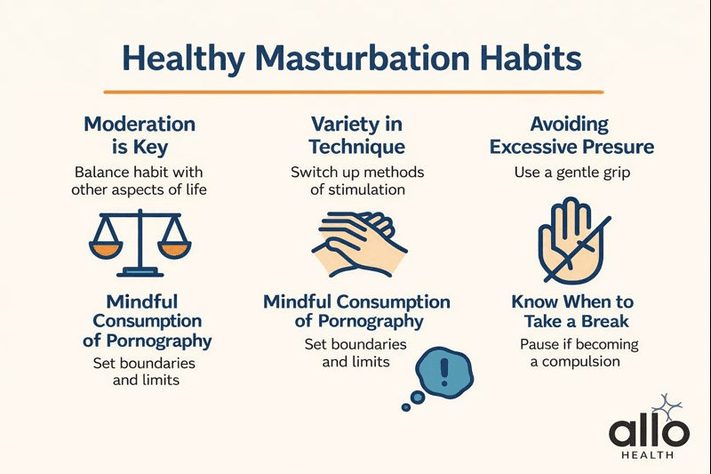Does Masturbation Cause Erectile Dysfunction? Myths vs. Facts
Medically reviewed by Dr. Sandip Deshpande

Dr Sandip completed his training in Psychiatry and sexual medicine in the UK. A post-graduate in Psychiatry from KMC Manipal, he worked in the UK for over 8 years following a one-year research post at NIMHANS, Bangalore. With an interest in the fields of sexual health and functioning, he has authored articles in books and peer-reviewed journals. A recipient of the student of the year award by BSART in 2010, he is currently a consultant psychiatrist and sexual and relationship therapist with a belief in a holistic and psychotherapeutic approach to treating psychological distress.
•
Written by Dr. Deepali Anand

Dr. Deepali is a medical writer and healthcare professional with a background in clinical surgery and patient care. Having transitioned from active clinical practice to medical communications, she specializes in bridging the gap between complex clinical data and patient education. Dr. Deepali is dedicated to creating evidence-based content that is grounded in scientific rigor and empathy, ensuring that sensitive topics like sexual wellness and mental health are accessible and empowering for every reader.
•
February 4, 2026
Our experts continually monitor the health and wellness space, and we update our articles when new information becomes available.

Quick Read
Does masturbation cause erectile dysfunction? No, it does not. Masturbation does not cause erectile dysfunction, and research shows no link between how often someone masturbates and long-term erection problems, even when pornography is used in moderation. In some cases, certain habits like gripping too tightly, relying heavily on porn, or feeling guilt or anxiety can temporarily affect arousal. These changes are short-term, related to behavior or mindset, and are not permanent or considered medical erectile dysfunction.
Does masturbation cause erectile dysfunction? No, masturbation doesn’t cause erectile dysfunction, and science backs that up. Still, this myth remains common, driven by internet forums, cultural taboos, and misinformation around sexual health.
Masturbation doesn’t lead to ED, not directly, but certain habits like excessive porn use, or feelings of guilt along with masturbation can sometimes affect sexual response temporarily.
In this article, we’ll bust the myths, explain what the research says, explore indirect factors, what really causes ED, and share tips for building a healthy, balanced masturbation habit.
Allo asks
Have you ever worried that masturbation could cause erectile dysfunction?
Can Masturbation Cause Erectile Dysfunction?
No, masturbation does not cause erectile dysfunction. According to Dr. Sandip Deshpande, sexologist at Allo Health with over 27 years of clinical experience, masturbation does not damage erectile function. In men, erection difficulties are more commonly linked to stress, performance anxiety, poor sleep, or arousal conditioning rather than any physical harm from masturbation.
A 2023 study published in The Journal of Sexual Medicine, involving 3,586 men, found a very weak to no link between masturbation frequency, pornography use, and erectile dysfunction[1].
In another 2021 study in JIMR Public Health & Surveillance, researchers found no direct link between how often someone masturbates and erectile dysfunction. It even included using pornography while masturbating, as long as it was for 30 minutes or less, and wasn’t associated with ED[2].
Interestingly, most people in the study didn’t watch porn for more than 30 minutes at a time, suggesting that moderate use of pornography is quite common and not harmful to sexual function.
What this means in plain terms:
- Masturbation frequency alone isn’t a reliable predictor of ED in research.
- Moderate pornography use, for most people, isn’t automatically linked with ED; patterns like dependence and overstimulation matter more.
Based on clinical data from 300,000+ consultations at Allo Health, masturbation is not identified as a direct cause of erectile dysfunction, while psychological and lifestyle factors are far more prevalent contributors.
Still, it is common for people to believe that masturbation, mainly excessive masturbation, can cause difficulty in getting or maintaining an erection. Let's try to understand this.

Where Does the Masturbation-ED Myth Come From?
You might’ve heard it at the gym, stumbled across it on Reddit, or had a friend say, “ masturbation leads to erectile dysfunction.” This belief has been around for a long time, shaped by cultural taboos, religious teachings, and a general lack of open, accurate conversation about sexual health.
In India, concerns around masturbation and erections are often shaped by where someone lives. In metro cities, men are more likely to access accurate information and seek professional advice early.
In tier-2 and smaller cities, stigma, privacy concerns, and limited sex education can allow myths to persist longer, delaying proper understanding or care. This difference often explains why anxiety-driven erection worries are more common than physical causes.
NoFap Movement and Masturbation
In recent years, movements like NoFap have gained popularity, especially among younger men. The idea behind NoFap is to take a break from masturbation and pornography in hopes of improving focus, energy, confidence, or sexual activity.
Masturbation is considered a normal and healthy part of sexual expression by sexual health experts. When done mindfully and without guilt, it doesn't damage your sexual health and certainly isn’t the root cause of ED.
Refractory Period and Masturbation
Another common reason people mistakenly believe masturbation causes erectile dysfunction is that they are unable to get an erection after masturbation, but it's completely normal.
This is called the "male refractory period", a completely normal recovery time after ejaculation when getting another erection is temporarily difficult or impossible. This has absolutely nothing to do with masturbation damaging erectile functioning. Think of it as your body's natural reset button.[3]
But what's important to understand here is that this period varies dramatically from person to person. For some men, it might be 15-30 minutes, while others need several hours. Age, stress levels, overall health, and individual biology all play a role.
Once this natural recovery period passes, your erectile function returns to normal.

Does Excessive Masturbation Cause Erectile Dysfunction?
Another important question is, can excessive masturbation cause erectile dysfunction? No, masturbation itself doesn’t cause erectile dysfunction, but certain habits, techniques, or emotional factors surrounding it can sometimes influence sexual response.
These effects are usually temporary and reversible, but worth understanding, especially if you're noticing changes in arousal or performance anxiety.
1. Death Grip Syndrome
- "Death grip syndrome" isn’t a medical diagnosis, but it’s a commonly used term to describe desensitization and reduced response to sexual stimuli caused by masturbating with excessive grip pressure.
- Men experiencing this may find it easy to climax during solo sex but struggle to reach orgasm during partnered sex. Some even feel they need to masturbate to finish, even when they’re with a partner.
But, in reality, it is more to do with the technique than frequency.
2. Pornography Dependency
- Porn itself doesn’t cause ED, but the way it’s consumed can play a role in some cases[4]. It’s important to note that masturbation frequency, even when paired with moderate porn use, is not associated with ED.
- But if someone is heavily dependent on porn, getting an arousal for erection as well as sexual satisfaction in a normal (non-porn) setting might become difficult. Some individuals may find partnered arousal feels less responsive over time.
3. Psychological Factors: Guilt and Shame
- Masturbation is often surrounded by shame, secrecy, or moral judgment. Masturbation guilt can lead to sexual performance anxiety. Performance anxiety can cause ED.
- But the issue isn’t physical, it’s psychological. Understanding and unlearning these beliefs, often with the help of a therapist, can make a big difference.
4. Injury to the Penis
- Excessive and traumatic masturbation, paired with wrong technique and pressure, can sometimes (even though rare) cause injury to the penis.[5]
- It can lead to basic friction injuries to a very rare penile fracture, which is basically a tear in the tissue that helps the penis become erect.
- Seek urgent medical care the same day if there’s severe pain, sudden swelling, bruising, or a “popping” sensation during masturbation or sex.
5 Healthy Masturbation Habits

Now that we know that masturbation does not cause erectile dysfunction directly, but developing unhealthy habits around masturbation can lead to erectile dysfunction.
1. Moderation is Key
- Masturbation isn’t harmful, but doing it too often can sometimes affect mental well-being or daily life.
- The key is balance; make sure it doesn’t interfere with work, relationships, or your overall routine.
2. Mix Up Masturbation Technique
- Using the same method every time can make your body overly used to one kind of stimulation.
- Try switching things up occasionally; this keeps your sexual response flexible and reduces the risk of desensitization.
3. Mindful Porn Use
- If you watch porn while masturbating, try setting limits.
- Over-reliance on porn can affect how your brain responds to normal sexual stimuli and intimacy.
4. Go Easy on the Grip
- A very tight grip can lead to reduced sensitivity and injury.
- Try a gentler touch or use lubrication. This helps maintain sensitivity and helps make partnered sex satisfying.
5. Know When to Take a Break
- If masturbation feels compulsive or like an escape from stress or boredom, it might be time to pause.
- Try other outlets like exercise, meditation, or spending time with others.
What Causes Erectile Dysfunction?
There are physical causes of ED as well as psychological causes of ED. It is important to pay attention to these and talk to your doctor if you are facing issues with erectile function.
Physical Causes of Erectile Dysfunction
- Diabetes, cardiovascular disease, and other blood-flow problems
- High blood pressure, high cholesterol, and obesity
- Neurological disorders (for example, stroke or Parkinson’s disease)
- Hormonal imbalances (including low testosterone)
- Chronic illnesses (kidney disease, sleep disorders)
- Medication side effects and aging
Erections rely on healthy blood flow and metabolic function. In the Indian context, diets high in refined carbohydrates, fried foods, and excess sugar can worsen conditions like diabetes, obesity, and high cholesterol, which are common contributors to erectile dysfunction.
A balanced diet that includes vegetables, fruits, nuts, pulses, and whole grains supports cardiovascular health and may help maintain normal erectile function.
Psychological Causes of Erectile Dysfunction
- Stress and anxiety (including performance anxiety)
- Depression, low self-esteem, and burnout
- Relationship or intimacy problems
- Guilt, shame, or past trauma
- Loss of interest in sex
- Porn-related unrealistic expectations or dependence patterns
When To See a Doctor
- ED lasts longer than 3 months
- Morning erections are consistently absent
- Diabetes, BP, heart disease, or smoking history
- New medications followed by erection changes
- Pain, curvature, or injury symptoms
Final Thoughts
Does masturbation cause erectile dysfunction? The answer is no. Masturbation is completely normal, and there's no scientific evidence linking regular masturbation to erectile dysfunction.
In fact, masturbation offers a lot of benefits, from physical to mental and sexual. But it is important to remember that moderation is key. If it starts to feel compulsive or gets in the way of your work, relationships, or well-being, it may be worth stepping back and resetting your habits.
If you're experiencing erectile difficulties, talk to your doctor as it can be due to underlying health conditions, lifestyle factors, medication effects, or psychological stress.
Disclaimer
The following blog article provides general information and insights on various topics. However, it is important to note that the information presented is not intended as professional advice in any specific field or area. The content of this blog is for general educational and informational purposes only. The content should not be interpreted as endorsement, recommendation, or guarantee of any product, service, or information mentioned. Readers are solely responsible for the decisions and actions they take based on the information provided in this blog. It is essential to exercise individual judgment, critical thinking, and personal responsibility when applying or implementing any information or suggestions discussed in the blog.
Most Asked Questions
Can masturbation cause erectile dysfunction?
No. Masturbation does not cause erectile dysfunction. Scientific studies and clinical evidence show no direct link between masturbation and long-term erectile problems.
Does excessive masturbation cause erectile dysfunction?
No. Even frequent masturbation does not directly cause erectile dysfunction. In some cases, habits around masturbation, such as excessive grip pressure, performance anxiety, or heavy porn reliance, may temporarily affect sexual response.
Can masturbating every day cause erectile dysfunction?
No. Masturbating daily is not harmful for most people and does not cause erectile dysfunction, as long as it does not interfere with emotional well-being, relationships, or daily functioning.
How do I know if my masturbation habits are unhealthy?
If it feels compulsive, disrupts daily life, or causes distress, it may be worth re-evaluating. Taking breaks or seeking support can help restore balance.
Can masturbation affect sexual performance with a partner?
Only in certain cases like when someone becomes overly reliant on a specific technique or porn. Healthy variety and open communication usually resolve this.
Can guilt or shame about masturbation affect my erection?
Yes. Emotional stress, guilt, or anxiety around masturbation can lead to performance issues. Talking to a therapist or sex educator may help.
When should I see a doctor for erection problems?
A medical evaluation is recommended if erection difficulties last longer than three months, occur consistently, or are accompanied by conditions such as diabetes, high blood pressure, low libido, pain, or injury.
Sources
- 1.
Do pornography use and masturbation play a role in erectile dysfunction and relationship satisfaction in men?
- 2.
Associations Between Online Pornography Consumption and Sexual Dysfunction in Young Men: Multivariate Analysis Based on an International Web-Based Survey
- 3.
The neurobiology of the male sexual refractory period
- 4.
Do pornography use and masturbation play a role in erectile dysfunction and relationship satisfaction in men?
- 5.
Traumatic masturbation and erectile dysfunction: A matched case-control study
Why Should You Trust Us?
Why Should You Trust Us?
This article was written by Dr. Sandip Deshpande, who has more than 27 years of experience in the healthcare industry.
Allo has the expertise of over 50+ doctors who have treated more than 1.5 lakh patients both online and offline across 30+ clinics.
Our mission is to provide reliable, accurate, and practical health information to help you make informed decisions.
For This Article
- We reviewed over 15 top-ranking articles on the topic of masturbation and erectile dysfunction to ensure this piece is thorough, up-to-date, and covers all common concerns.
- We analyzed 15+ peer-reviewed research studies, including large-scale surveys from 2021 and 2023, to back our claims with credible scientific evidence.
- We referenced insights from leading sexual health organizations and medical journals to make sure the content reflects current medical consensus.
- We explored popular platforms like Reddit and YouTube, where real people talk about their struggles with masturbation, ED, and movements like NoFap, helping us address not just the science but the social conversation around it.
- We consulted expert-reviewed sexual wellness resources to offer balanced, non-judgmental advice on building healthy solo habits and understanding the real causes of erectile dysfunction.


